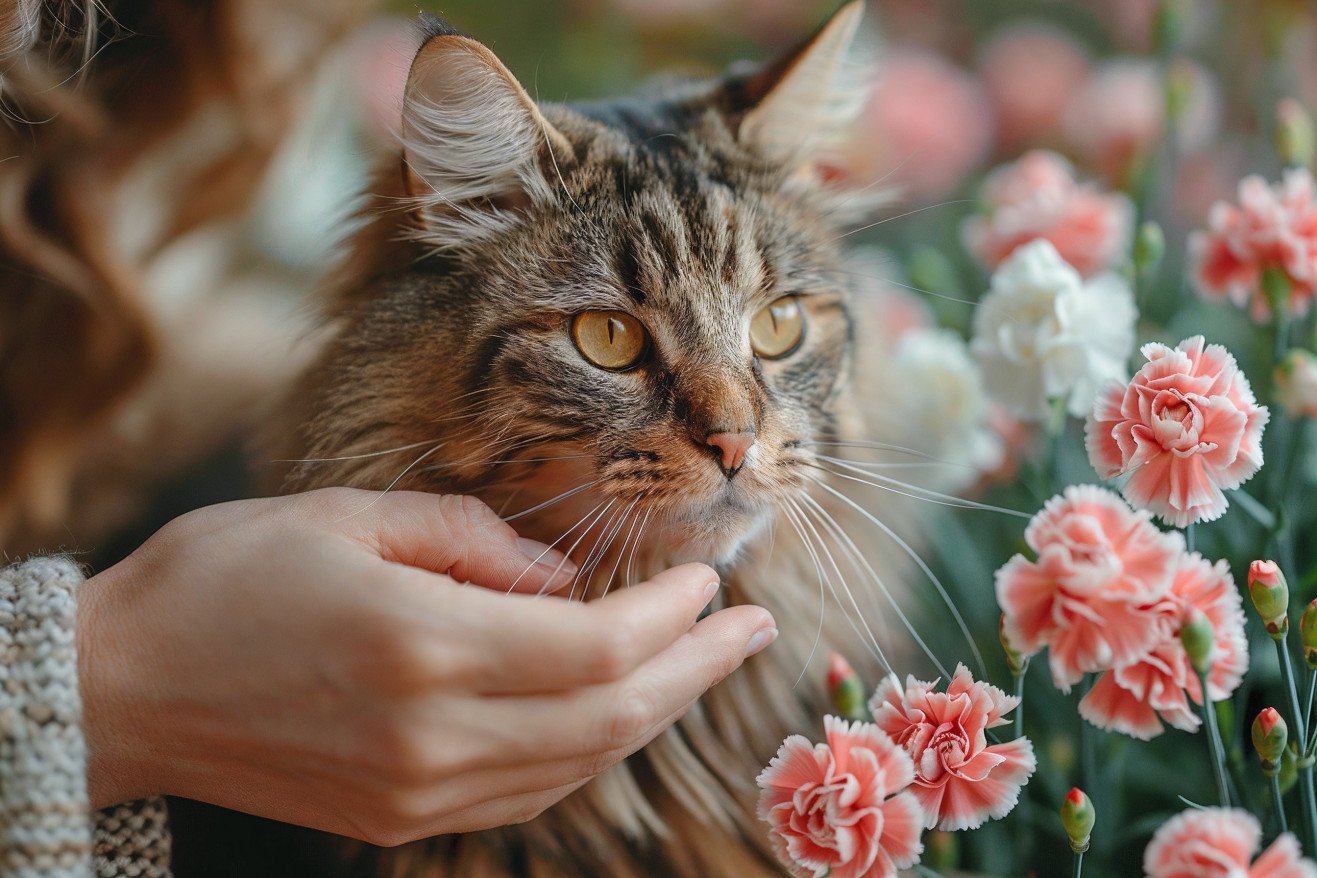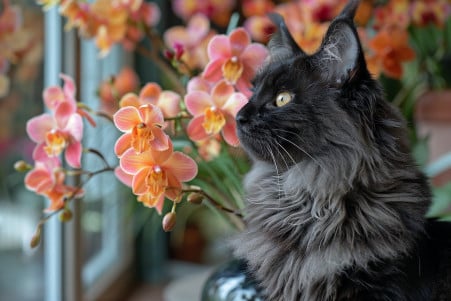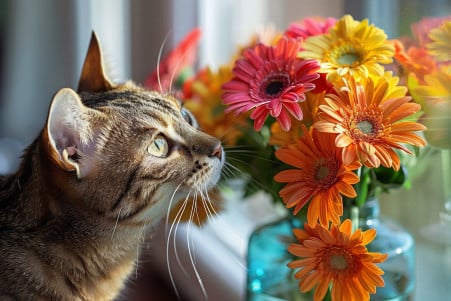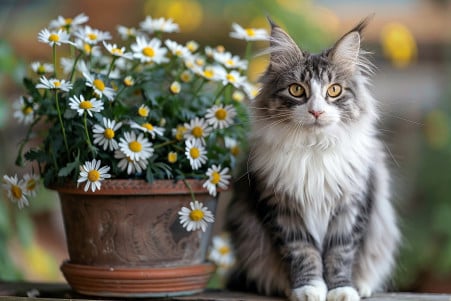Can Cats Eat Carnations? An In-Depth Review
19 May 2024 • Updated 18 May 2024

Carnations are a well-loved flower, but if you have a cat, you may be concerned about whether or not they are safe to have in your home. The good news is that carnations are not poisonous to cats, although eating large amounts of the fibrous petals and leaves can lead to stomach upset, including vomiting and diarrhea.
This article will take a deep dive into veterinary and toxicology research to help you better understand exactly what happens when cats eat carnations. By looking at things like the plant's make-up and anecdotal information, you will leave with a good understanding of how to make sure your cat stays safe while still enjoying these popular flowers in your home.
Are carnations poisonous to cats?
What Parts of the Carnation Plant Are Toxic to Cats?
According to Carnations Are Toxic To Cats, all parts of the carnation plant, including the flowers, leaves, and stems, contain triterpenoid saponins, the toxic compounds that are harmful to cats. The toxicity of these compounds can vary depending on the specific type of carnation and the amount a cat has consumed.
While a small amount may only cause mild gastrointestinal upset, larger amounts can cause more serious symptoms, including vomiting, diarrhea, and skin irritation, notes Cooper Pet Care. There is no known safe amount of carnation that a cat can consume. As shown in the JustAnswer case study, even "a pretty decent amount" of carnations can cause prolonged vomiting and a loss of appetite in some cats.
To stay on the safe side, it's best to make sure your cat doesn't consume any part of the carnation plant. Since the saponin toxins are found in all parts of the plant, the best way to avoid potential poisoning is to make sure cats don't have access to carnations at all.
Are There Other Dianthus Plants That Are Toxic to Cats?
Carnations are part of the Dianthus genus, which also includes other popular flowers like pinks and sweet Williams. According to My Cat Likes To Eat My Dianthus Flowers-will It Make... - Kentucky Living, other Dianthus plants contain triterpenoid saponins like carnations and are mildly toxic to cats. If cats eat these plants, they may experience the same symptoms as carnations, including stomach upset, diarrhea, and skin irritation.
Although the toxicity of different Dianthus plants may be slightly different, Are Carnations Poisonous to Cats? | Cuteness recommends that all Dianthus plants be kept away from cats. Pet parents should be aware of any Dianthus plants in their homes or yards to ensure their cats don't accidentally eat them.
How to Keep Cats Away From and Out of Carnations
The most effective way to keep cats safe from carnation poisoning is to keep them away from the flowers. According to How to Keep Cats Out of House Plants and Cut Flowers - The Creek Line House, this can be done by keeping cut carnation bouquets in a room that your cat can't access, using vases with pet-safe covers, or keeping the flowers in a room that your cat can't enter.
To keep cats away from potted carnations or carnations in an outdoor garden, the article suggests using physical barriers like chicken wire or netting to keep cats away from the plants. Cats can also be deterred from going near plants with the use of citrus peels, cayenne pepper, or sticky surfaces. Finally, you can also offer your cat safe plants to chew on, like cat grass or catnip, to keep them away from other plants.
As Are Carnations Toxic to Cats? Here's What to Know notes, since it's hard to say how much carnation a cat would need to eat to get sick, the best way to keep cats safe is to keep them away from carnations altogether. By following these tips, you can make sure your cat stays safe around this popular flower.
What to Do If Your Cat Eats Carnations
If you think your cat has eaten any part of a carnation plant, you should take action immediately. As the case study on JustAnswer explains, even "a pretty decent amount" of carnations can cause some cats to vomit for a long time and refuse to eat. Watch for symptoms such as vomiting, diarrhea, drooling, or skin irritation, and make a note of how much you think your cat may have eaten.
Call your vet or the ASPCA Animal Poison Control Center right away to find out what you should do. Your vet may suggest that you induce vomiting, give your cat supportive care, or have your cat come in for observation, depending on how much your cat has eaten. As the veterinary toxicologist in the JustAnswer case explains, carnations are not toxic, and the symptoms are mild, so most cats will make a full recovery within a day or two if they receive the right treatment and aren't exposed to carnations again.
More Poisonous Plants to Be Aware of for Cats
While carnations are a popular flower that can be poisonous to cats, there are many other plants that can be harmful to felines. According to CAES Newswire, highly toxic plants such as lilies, sago palms, and oleander can cause severe symptoms and even death in cats. Meanwhile, moderately toxic plants like tulips, azaleas, daffodils, and ivy can cause gastrointestinal upset and skin irritation, according to 1800Flowers Petal Talk and the ABC Everyday article.
Pet parents should make sure to look up any new plants they're thinking of bringing into their homes to see if they're toxic to cats and then take the necessary steps to ensure their feline friends can't get to them, as noted by Bloominghaus. Checking lists like the ASPCA's list of toxic and non-toxic plants can help people make sure their homes are safe for their cats.
Conclusion: How to Keep Your Cat Safe Around Carnations and Other Toxic Plants
Although carnations are only mildly toxic to cats, they can still be dangerous if ingested and should be treated with caution. The best way to keep cats safe from carnations and other potentially toxic plants is to prevent exposure. This can be done by keeping the plants out of reach and making sure that cats can't access them. If exposure does occur, contact a vet right away and be ready to provide information about the situation.
Pet owners should also familiarize themselves with other common household plants that may be toxic to their cats. With the right precautions and a cat-safe environment, carnations can be enjoyed without worry.


